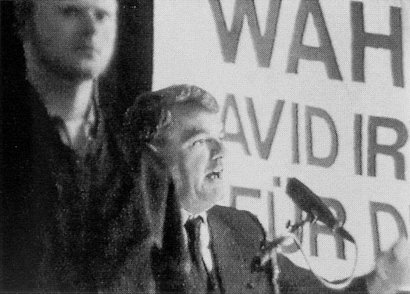 |
 |

by Yale F. Edeiken
From January 11, 2000, through March 16, 2000, an extraordinary trial captioned "Irving v. Penguin Books and Lipstadt" took place in London. The Holocaust was not on trial in London. Neither was this case merely about whether statements made in Prof. Lipstadt's book "Denying the Holocaust" (1993) about David Irving were false and defamatory. This trial was about the freedom to criticize bigotry masquerading as scholarship. This case was nothing other than a single battle in a war waged by David Irving to silence his critics.
In the sense that a historical event like the Holocaust can be put "on trial," the Holocaust has been in that position since the IMT trial at Nuremberg and it has withstood all challenges. The fact that the Third Reich engaged in the planned genocide known as the Holocaust has been established in hundreds of civil and criminal trials under American, British, French, Canadian, German and Israeli law in the half century since the end of World War II. None of the fraudulent allegations of the lunatic fringe which denies the Holocaust has even been established as worthy of belief in any of those trials.
These articles do not deal with the issues, direct or indirect, of that trial. They are about the legal realities of the trial and reasons why David Irving failed to prove his case. It is important because of the penchant of Irving and his followers to twist and distort not only the history of the Holocaust but of their battles against it. The spinning of what happened in that courtroom in London began even before the verdict was announced. David Irving's final argument was not even addressed to the court, but to the lunatic fringe that was already proclaiming that Irving won the trial and would be deprived of victory only by the dishonesty of the legal system.
That is not true. David Irving lost his case because the evidence was against him. Nothing in these articles should be read to state or imply that David Irving had a legitimate cause of action against Prof. Lipstadt which was ruined by his incompetence as a litigator. On the contrary, the facts, Irving's dishonest methods as a historian, and his connections with the lunatic fringe of right-wing Holocaust deniers doomed him to defeat.

Photo of Irving speaking at celebration of Hitler's birthday,
Munich Löwenbräukeller, 1990. Caption reads: "'Historian' David Irving,
here next to
skinhead-leader Hainke, denies the Holocaust." *
Nor are these articles about the overwhelming evidence about the Holocaust. The overwhelming evidence that proves that the Holocaust occurred beyond a shadow of a doubt can best be found in the large body of historical work that has been researched and written about that horrific period of history. Further almost all of the crucial evidence was presented to the court piecemeal in documentary form. This makes systematic analysis of the evidence before the court even more difficult.
The thesis of these articles is that David Irving's case was ill-conceived, ill-planned, and ill-tried. It is an attempt to show that the fraud and dishonesty that permeates Irving's historical writing was evident in his conduct of the trial as well.
There are certain problems in dealing with this trial as a legal event. The author is an American lawyer with no expertise in the British law of defamation, British civil procedure or British courtroom practice. For this reason I have not attempted to analyze either the evidence presented. the manner of its presentation, or its significance in a legal sense. It is clear, for example, that Sir John Keegan could not have been compelled to testify in an American court as it would have violated the Fifth Amendment of our Constitution. Likewise it would have been reversible error to allow either Kevin MacDonald's "expert" testimony or Irving's closing argument to be presented to an American jury. Similarly a proper Motion in Limine or Motion for Partial Summary Judgment would have barred much of Irving's evidence about a "Jewish conspiracy" against him. This author hopes that some expert in British law will some day deal with these and other issues.
Nevertheless there are some universal verities that apply in any civil court based upon the Anglo-American or "common law" system of justice. The basic purpose of an opening statement and the principles of making an effective opening statement are identical whether the court is in London, England, London, Ontario, or New London, Connecticut. The same is true of a closing argument. For that reason, the author has chosen to concentrate on three phases of the trial: David Irving's announced reason for bringing his action in Great Britain, his opening statement, and his closing argument. The author believes they are illustrative of both Irving's methods and his lack of integrity.
Finally, these three articles are dedicated to the man who taught me the value of incisive reasoning, Jack Edeiken, M.D. In a sense it is a redundancy, for everything this author writes owes a debt to Dr. Edeiken that can never be repaid.
Go to Part 1: "First you read the instructions"
Photo from Schmidt, Michael, Heute gehört uns die Straße... Der Inside-Report aus der Neonazi-Szene (Today the Streets are Ours: The Inside Report from the Neo-Nazi Scene), 1994, p. 10.
Last modified: April 11, 2000
Copyright © 2000 by Yale F. Edeiken. All rights reserved.
Technical/administrative contact: [email protected]